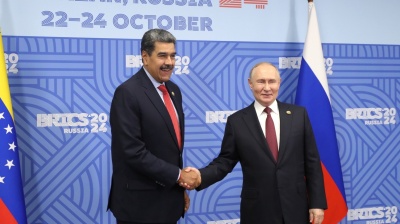Turkey’s annual consumer price inflation jumped from 10.85% in April to 12.15% in May, taking the rate up to the highest level recorded since last November’s 12.98%, the Turkish Statistical Institute (TUIK) announced on June 4.
Markets had expected 11.95% for May, according to a survey by BloombergHT. The worse-than-expected inflation data has pushed up expectations for the introduction of a rate hike by the next Monetary Policy Committee (MPC) meeting, scheduled for June 7. The Turkish lira (TRY), down towards 20% against the dollar in the year to date, strengthened 0.51% d/d against the USD to trade at 4.6274 as of 11:00 local time. However, analysts feel its strengthening is being contained by nervousness among investors that if elected as Turkey’s first executive president on June 28, Turkish President Recep Tayyip Erdogan—an economic populist who has openly advanced his unorthodox theory that higher interest rates cause faster inflation and that as executive president he will have a duty to be at the monetary policy helm—may once again start encroaching on the central bank’s independence.
As the lira gained, the benchmark BIST-100 stock market index was up 0.96% to 100,121.
On May 29, six days after the emergency rate hike of 300 basis points was pushed through by the central bank, two unnamed money managers who met with central bank governor Murat Cetinkaya and Deputy Prime Minister Mehmet Simsek in London told Bloomberg that Turkey was prepared to raise interest rates again if its double-digit inflation accelerated.
Further tightening would depend on the May inflation data to be released on June 4 and Turkey would not resort to introducing capital controls, the people, who asked to remain anonymous, also reportedly cited the officials as saying.
The risk that interest rate rises could trigger a sudden stop in a substantial amount of economic activity is starting to become pronounced. The central bank has hiked its main funding rate by 375bp in all since April 26.
Turkey’s inflation jumped into the double digits in February 2017. Since then the rate has only once moved back into the single digits, with that occurrence recorded in July last year due to the base effect of an economic soft spot caused by the July 2016 failed coup. After last November’s 12.98%, there was a slow descent to the March figure of 10.23% before the re-escalation of inflation in the past two months.
Annual food inflation fastened from 8.81% in April to 11% in May.
Meanwhile, the deterioration in core inflation metrics and producer price inflation worsened in May.
The annual rise in the C-index, one of the central bank’s favourite core inflation indicators, rose from 12.24% in April to a record high of 12.64% in the month.
TUIK also reported on June 4 that annual PPI jumped from 16.37% in April to 20.16% in May, the highest level seen since August 2003.
Annual PPI fell to 12.14% in January, the lowest level since December 2016, after hitting 17.30% last November, the highest level since July 2008. PPI inflation has skyrocketed since January.
News

Turkish state grabs another fintech as company seizures continue at pace
Turkey first seizes companies, then tries the suspects. Some companies are sold before the trial process.

Ukraine’s elite HUR forces turn the tide in the battle for Pokrovsk, as Russia’s effort to capture key logistics hub fails
The battle for Pokrovsk became intense early on November 1and it looked like the fall of the key logistics hub to Russia was imminent. But a bold counterattack by Ukraine’s elite HUR forces seems to have turned the tide.

US prepares attack on Venezuela as Maduro begs Putin for aid
The Trump administration has reportedly drawn up a list of potential military targets within Venezuela as part of its intensifying pressure on President Nicolás Maduro, who has turned to Moscow seeking urgent military assistance.

Bulgaria suspends fuel exports to EU after US sanctions Lukoil
Bulgaria has temporarily suspended exports of petroleum products to European Union countries after the United States imposed sanctions on Russian oil giant Lukoil.



